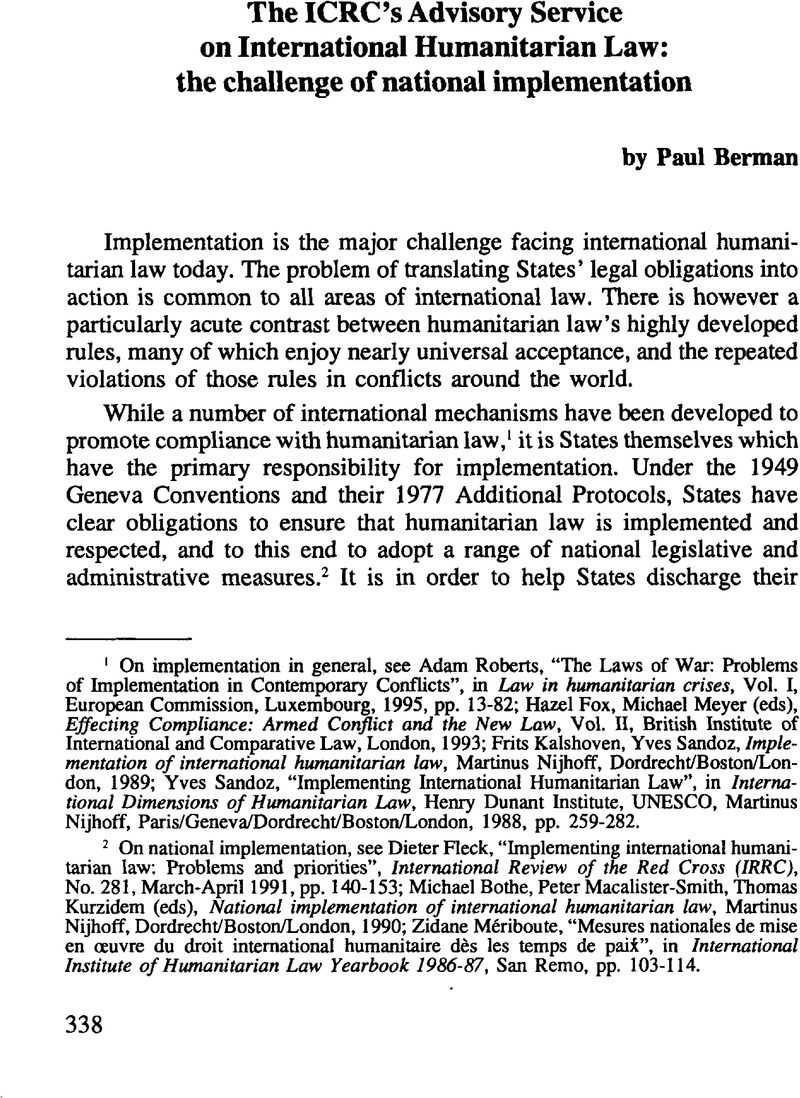Article contents
The ICRC's Advisory Service on International Humanitarian Law: the challenge of national implementation
Published online by Cambridge University Press: 23 November 2010
Abstract

- Type
- International Committee of the Red Cross
- Information
- International Review of the Red Cross (1961 - 1997) , Volume 36 , Issue 312 , May 1996 , pp. 338 - 347
- Copyright
- Copyright © International Committee of the Red Cross 1996
References
1 On implementation in general, see Roberts, Adam, “The Laws of War: Problems of Implementation in Contemporary Conflicts”, in Law in humanitarian crises, Vol. I, European Commission, Luxembourg, 1995, pp. 13–82 Google Scholar; Fox, Hazel, Meyer, Michael (eds), Effecting Compliance: Armed Conflict and the New Law, Vol. II, British Institute of International and Comparative Law, London, 1993 Google Scholar; Kalshoven, Frits, Sandoz, Yves, Implementation of international humanitarian law, Martinus Nijhoff, Dordrecht/Boston/London, 1989 Google Scholar; Sandoz, Yves, “Implementing International Humanitarian Law”, in International Dimensions of Humanitarian Law, Henry Dunant Institute, UNESCO, Martinus Nijhoff, Paris/Geneva/Dordrecht/Boston/London, 1988, pp. 259–282 Google Scholar.
2 On national implementation, see Fleck, Dieter, “Implementing international humanitarian law; Problems and priorities”, International Review of the Red Cross (IRRC), No. 281, March-April 1991, pp. 140–153 CrossRefGoogle Scholar; Bothe, Michael, Macalister-Smith, Peter, Kurzidem, Thomas (eds), National implementation of international humanitarian law, Martinus Nijhoff, Dordrecht/Boston/London, 1990 Google Scholar; Meriboute, Zidane, “Mesures nationales de mise en œuvre du droit international humanitaire des les temps de paix”, in International Institute of Humanitarian Law Yearbook 1986-87, San Remo, pp. 103–114 Google Scholar.
3 See National measures to implement international humanitarian law: Resolution of the 25th International Conference of the Red Cross (Geneva, 1986): Written represen tations by the International Committee of the Red Cross, ICRC, Geneva, October 1991 Google Scholar; “National measures to implement international humanitarian law: A new move by the ICRC”, IRRC, No. 263, March-April 1988, pp. 121–140 CrossRefGoogle Scholar.
4 “Final Declaration of the Conference”, Section II, para. 5, IRRC, No. 296, September-October 1993, pp. 377–381.CrossRefGoogle Scholar
5 “Meeting of the Intergovernmental Group ofExperts for the Protection of War Victims (Geneva, 23–27 January 1995): Recommendations” (hereinafter referred to as “Recommendations”), Sections III, V, VI, IRRC, No. 304, January-February 1995, pp. 33–38.Google Scholar
6 “International humanitarian law: From law to action”, report presented by the ICRC, in consultation with the International Federation of Red Cross and Red Crescent Societies, on the follow-up to the International Conference for the Protection of War Victims, IRRC, No. 311, March-April 1996, pp. 194-222.
7 See IRRC, No. 310, January-February 1996, pp. 58-60.
8 On the ICRC's role in relation to implementation, see Toni Pfanner, “Le rô1e du Comité international de la Croix-Rouge dans la mise en oeuvre du droit international humanitaire”, in Law in humanitarian crises, op. cit. (note 1).
9 By mid–1996, the Service comprised three lawyers and a researcher based in Geneva, and five lawyers based in Abidjan, Amman, Bogota, Moscow, and New Delhi.
10 The Advisory Service has also assumed responsibility for the ICRC's role in encouraging States to become party to the 1977 Additional Protocols. An important part of this task is to explain to governments the obligations which this entails. See Hans-Peter Gasser, “Universal acceptance of international humanitarian law - Promotional activities of the ICRC”, IRRC, No 302, September-October 1994, pp. 450–457.
11 See notes 1 and 2 above and in particular Dieter Fleck, “Implementing humanitarian law: Problems and priorities”, op. cit. (note 2). The ICRC has prepared an “indicative list” of those articles of the Geneva Conventions and their Additional Protocols which may require national implementing measures, published in the IRRC, No. 263, March-April 1988, pp. 133–140. See also “Implementation of the Protocols”, IRRC, No. 217, August 1980, pp. 198–199.
12 For a discussion of national implementation legislation, see e.g. Meyer, Michael and Rowe, Peter, “The Geneva Conventions (Amendments) Act 1995: A Generally Minimalist Approach”, International and Comparative Law Quaterly, April 1996, Vol. 45, Part 2, pp. 476–484 CrossRefGoogle Scholar; Hannikainen, Lauri, “Implementation of International Humanitarian Law in Finnish Law”, in Hannikainen, Lauri, Hanski, Raija and Rosas, Allan, Implementing Humanitarian Law Applicable in Armed Conflict: The Case of Finland, Martinus Nijhoff, Dordrecht/Boston/London, 1992, pp. 114–145 Google Scholar; Drzewicki, Kryzstof, “International humanitarian law and domestic legislation with special reference to Polish law”. Revue de droit penal militaire et de droit de la guerre, XXIV–1–2, 1985, pp. 29–52 Google Scholar.
13 Armenia, Azerbaijan, the Czech Republic, Estonia, Georgia, Kazakhstan, Kyrgyzstan, Latvia, Lithuania, Namibia, Slovenia, Tadjikistan, Turkmenistan, Uzbekistan, Zambia, and Zimbabwe. An example of the conclusions of one of these seminars (Namibia) i s published below on pp. 348-350.
14 The Intergovernmental Group of Experts referred to the assistance of National Societies and of the International Federation of Red Cross and Red Crescent Societies in providing advisory services (“Recommendations”, op. cit. (note 5), Section III, para. 1). A meeting of ICRC, the Federation and National Society experts was held in Geneva in November 1995 to discuss the work of the Advisory Service.
15 “Recommendations”, op. cit. (note 5), Section VI.
16 These include Albania, Argentina, Australia, Austria, Belgium, Bolivia, Bulgaria, Chile, Denmark, Finland, Germany, Indonesia, Italy, Norway, Portugal, Sweden, Uruguay and Zimbabwe. For a description of the composition and work of a national committee, see Offermans, Marc, “The Belgian Interdepartmental Commission for Humanitarian Law”, IRRC, No. 281, March-April 1991, pp. 154–166 CrossRefGoogle Scholar.
17 “Recommendations”, op. cit. (note 5), Section V, paras 1-2.
18 Ibid., para. 3.
19 This meeting will be held in Geneva in October 1996.
20 “Recommendations”, op. cit.. Note 5, Section III, para. 3.
- 5
- Cited by


